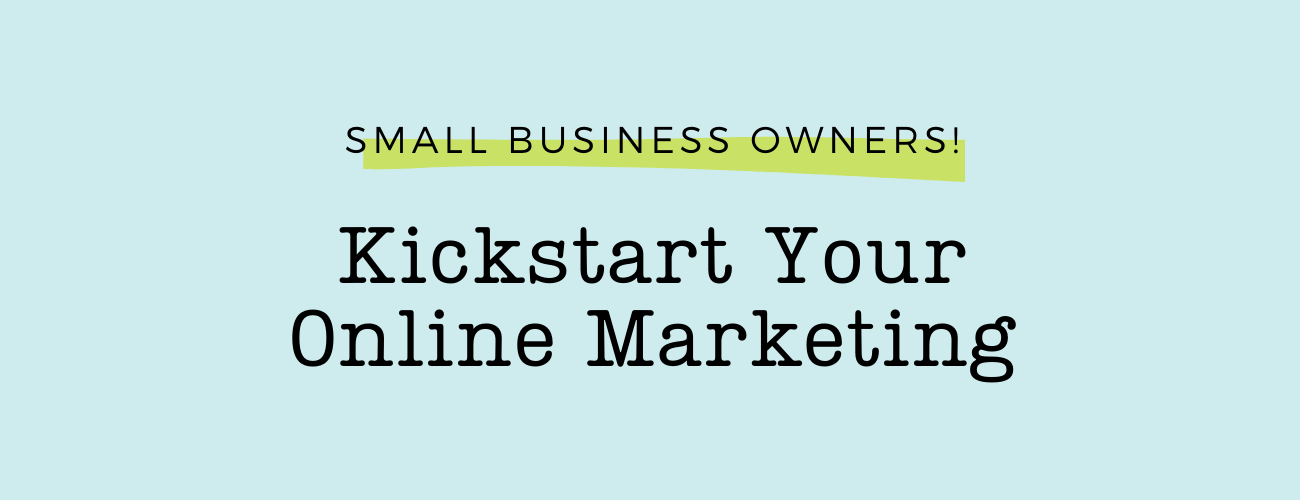For small business owners looking to grow their business, online marketing can be a daunting next step. They know that social media and SEO are things that they should be doing, but they don’t know where to start in the ever-changing world of internet marketing. Sound like you? Then listen up! We’re about to break it down for you into small and actionable segments.

Website
Creating a great website is absolutely essential. Your website is the nucleus of all of your online marketing efforts. From social media to email to paid ads, they all drive people to your website. So make it the best it can be.
Your website should be helpful, easy to navigate, and mobile-friendly. It needs to be updated regularly with fresh content and contain messaging that supports your business goals.
There are many criteria that make up a smooth and effective website—more than we can cover here. Check out this recent blog post for an easy checklist to help you determine if your website needs an upgrade. If it does need to be updated, that’s step one. Don’t skip it.
Google My Business
When you use Google search to find a local business, you’ll see helpful Google listings containing relevant information (phone number, address, photos, reviews) about the businesses in your area. When potential customers discover your Google My Business listing, what will they see?
- Is the business information correct?
- Do you have positive reviews? (More on this later)
- Are there photos of your location or product?
- Have you posted recent updates?
If you didn’t answer yes to all of these, you’ve got work to do. Not only is an updated GMB listing attractive to customers, it also has local SEO value. The more you maintain your Google My Business, the better your business will fare in local search results. Keeping up your GMB listing is very simple work (and the platform is free to use), but it must be done regularly.
We wrote an article on exactly how to get started with Google My Business that we recommend giving a read.
Get Reviews
This one relates back to that Google My Business listing we just talked about. When someone finds your business’s Google listing, they will see a reviews section. Reviews from real customers serve as social proof to consumers considering your product or service. It is important to have not only a high star rating but also a high number of reviews to make people feel confident in your business.
The good news is: getting reviews for your business is easy. Simply ask for them. As a matter of standard operating practices, ask every customer for a review—perhaps as a follow up email when a sale or project is complete.
Check out some of our other blogs to learn more about how and why you should stockpile those Google reviews:
Google Reviews: A Local SEO Must Do
The Importance of Google Reviews for A Small Business
Social Media
Are your social media profiles looking like a ghost town? When a potential customer visits your Facebook, Instagram, or LinkedIn, what impression will they get? If you haven’t posted in months or even years, that prospect might wonder “Is this company still in business?” Not every small business needs a huge social media presence, but you at least want it to look like somebody’s home.
Choose one or more social media platforms to stay active on, depending on the nature of your business. You’ll want to post 1-5 times per week on your social accounts. Make sure you are creating social content that your target audience will want to see. Some good content ideas for social media include:
- Informational content that answers commonly asked questions
- Behind the scenes content of your business
- Photos of your product or service
- Employee Spotlights
- Customer reviews/testimonials
- Quick tips and advice
- Funny memes that relate to your industry or niche
Set aside a little time each week to create social media content and create a posting schedule. And make sure to brush up on each social platform to learn how to gain the right followers.
Read our blog titled Fish Where the Fish Are to help decide which social media platforms to use for your business!
Email Marketing
No, it’s not dead. It’s very much alive and thriving. In fact, email marketing is one of the most effective and affordable ways to communicate with your customers. Everyone uses email and most people check their inbox many times per day.
You can use email in a number of ways: a company newsletter, automated follow-up emails, special offer announcements. And you can segment your email list based on numerous factors so that you can ensure your message is getting to the right person at the right time.
No matter what industry you’re in, you can make email work for your business.
Read our blog to learn more about the wonders of email marketing.
Paid Ads
Want to get your business in front of potential customers? Paid ads are a way to have more people see your content. From Facebook/Instagram to LinkedIn to Google, there are many ways you can pay to play. You can choose how much you want to spend and what demographics will see your ad.
A well-crafted advertisement can bring in tons of new business. But if your ad isn’t appealing to your target audience, you could be throwing money down the drain. Make sure you have a solid plan before investing in paid advertising.
Get Help!
We realize that this is a lot of work. You can make it a little easier by using the COPE method, but it’s still going to take up time. If time is not something you have an excess of, then we recommend outsourcing some of your marketing work. Most entrepreneurs are not experts on the ever-changing world of internet marketing, but marketing companies (like us!) specialize in doing this work well.
If you are struggling to maintain your online marketing efforts or want to get started for the first time, we’d love to talk to you!

